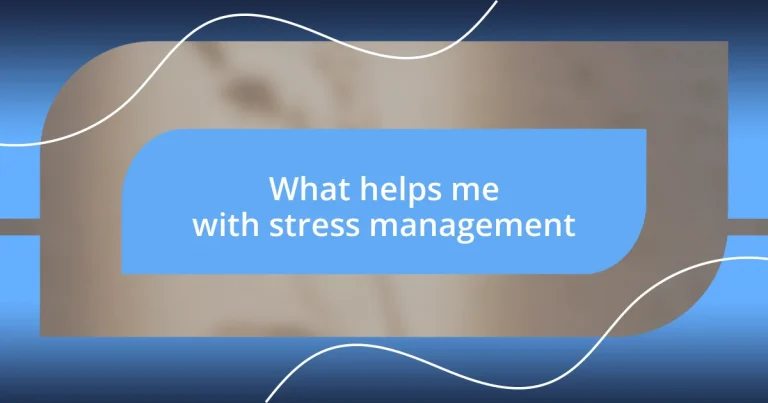Key takeaways:
- Stress can manifest physically and emotionally, impacting sleep, relationships, and overall health; recognizing its effects is crucial for management.
- Effective stress management techniques include deep breathing, physical activity, and mindfulness meditation, each offering significant mental health benefits.
- Nutrition and a supportive social network play vital roles in managing stress, highlighting the importance of dietary choices and emotional connections in alleviating stress levels.
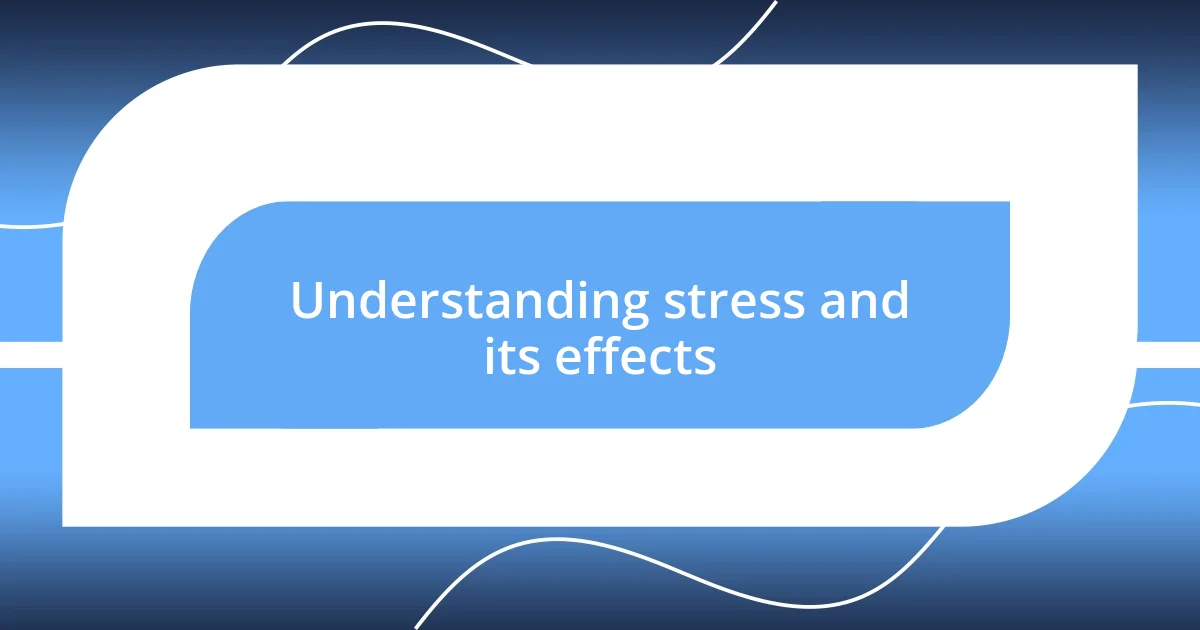
Understanding stress and its effects
Stress is something we all face, often without realizing its profound effects on our bodies and minds. I remember a time when I was juggling multiple deadlines at work, and I felt this constant weight on my chest. Have you ever felt that way? That tightness signals how stress can manifest physically, affecting everything from our sleep patterns to our relationships.
When I’m overwhelmed, it seems like everything gets amplified—the smallest tasks feel monumental, and joy seems to slip away. This heightened sensitivity is a common response to stress; our brains go into overdrive, preparing us for battle, even if there’s no immediate danger. How often do we allow ourselves to check in with those feelings instead of pushing through?
Understanding stress is crucial. I’ve learned that it’s not just an emotional experience; it disrupts our hormonal balance and can lead to serious health issues like anxiety and depression if neglected. Sometimes, I catch myself reflecting on how a simple walk can have a profound effect on my stress levels. Have you ever noticed how stepping outside can shift your mindset? Recognizing these responses can empower us to take control of our stress rather than let it control us.
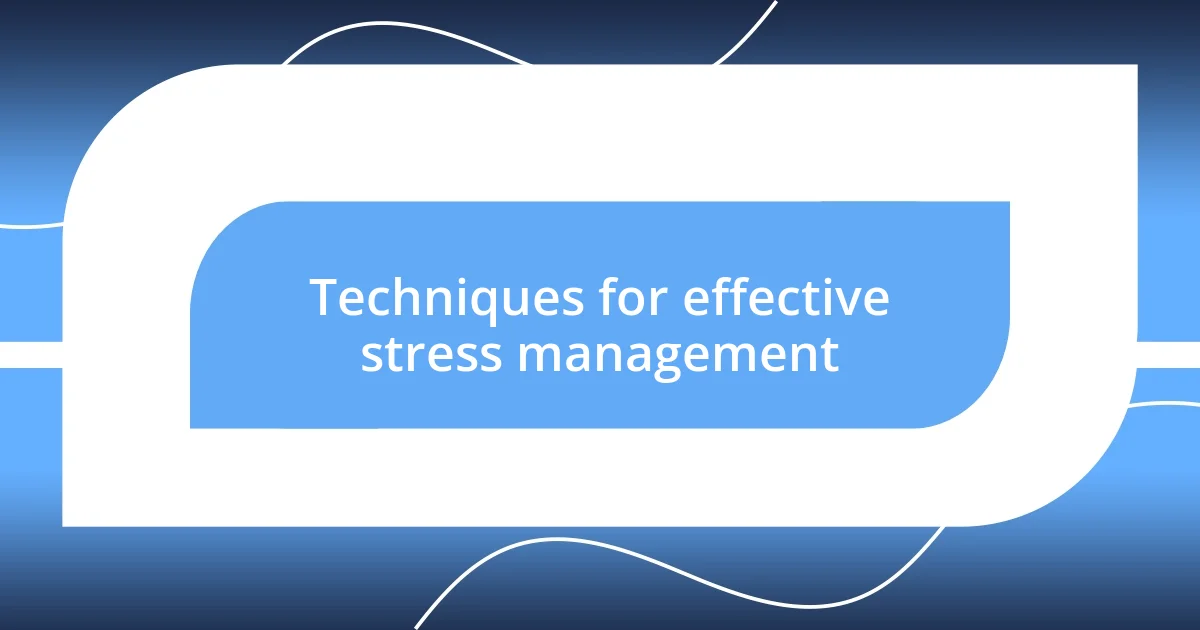
Techniques for effective stress management
When I think about stress management techniques, deep breathing exercises come to mind. I’ve often found myself sitting quietly in my car before going into a meeting, practicing slow, intentional breaths. Just a few minutes of this can help reset my focus and calm my racing mind. Have you tried taking a moment to breathe deeply? It’s a simple yet powerful tool to bring yourself back to the present moment.
Another technique that has greatly benefited me is physical activity. There’s something about moving my body that allows stress to release. I recall a particularly stressful week when a long run transformed my mood completely. As I hit my stride, worries felt lighter and my thoughts became clearer. Regular exercise doesn’t just promote physical health; it’s a mental game-changer. Have you found a movement or activity that helps you decompress?
Mindfulness meditation is a technique I now swear by. Initially, I was skeptical, believing it was just a trend, but committing to a few minutes daily has really changed my perspective. It’s intriguing how observing my thoughts without judgment can lead to a sense of calm. I remember the first time I truly focused on mindfulness during a hectic day—it was like lifting a fog. Experiencing that clarity has made me appreciate the power of being present, and maybe you’ll discover the same.
| Technique | Benefit |
|---|---|
| Deep Breathing | Reduces anxiety and promotes relaxation. |
| Physical Activity | Releases endorphins, boosting mood and reducing stress levels. |
| Mindfulness Meditation | Increases awareness and can lead to improved emotional regulation. |
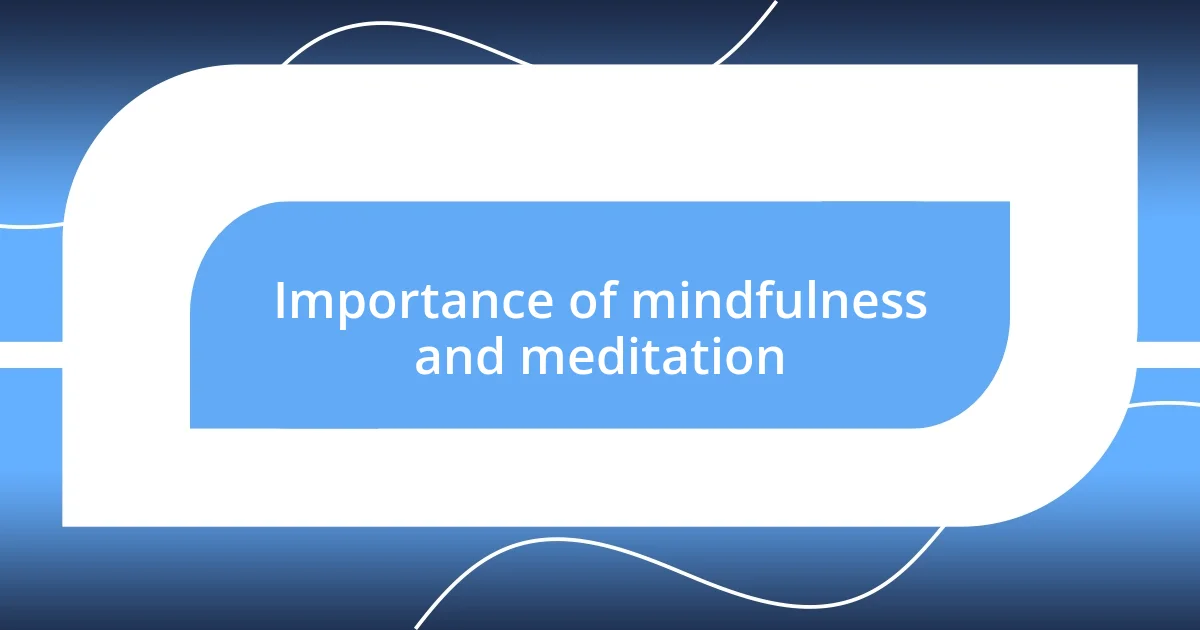
Importance of mindfulness and meditation
Mindfulness and meditation hold a special place in my heart when it comes to managing stress. In my experience, these practices serve as a sanctuary amidst the chaos of daily life. I remember the first time I dedicated a few quiet moments to just observe my breath. It felt like pulling back the curtain on my bustling mind. That stillness opened up a space where I could simply be, free from the weight of expectations. I realized how empowering it is to step back and notice my thoughts without getting swept away by them—an invaluable skill during stressful times.
The beauty of mindfulness and meditation lies in their simplicity yet profound impact. Here are some benefits I’ve personally experienced:
- Increased Clarity: Embracing mindfulness allows me to sift through the clutter in my mind, giving me clarity on what truly matters.
- Enhanced Emotional Balance: Meditation has helped me respond to challenges with a more level-headed approach, rather than reacting impulsively.
- Stress Reduction: Just a few minutes of deep focus daily can significantly lessen feelings of stress. I’ve felt that tension in my shoulders ease after a brief session.
- Improved Focus: Cultivating mindfulness has sharpened my concentration, making daunting tasks more manageable.
Have you ever felt that rush of calm after a few mindful moments? It’s like finding a hidden pathway out of a maze of stress.

Nutrition’s impact on stress levels
When it comes to nutrition, I’ve noticed that what I put into my body can directly influence my stress levels. For instance, after a long, hectic day, I’ve often reached for comfort foods like chips or ice cream, only to feel a temporary lift followed by a heavy lull. It made me realize that opting for nutrient-rich foods, like fruits, vegetables, and whole grains, not only energizes me but also keeps my mood steady. Have you ever considered how your dietary choices affect your emotional well-being?
I’ve also found that certain foods can genuinely help lower stress. Foods rich in omega-3 fatty acids, such as salmon and chia seeds, have been known to reduce anxiety. On days when I make a conscious effort to include these ingredients, I feel a notable difference in my outlook and resilience against stress. This connection isn’t just a coincidence; it’s fascinating how nutrition can act as a supportive buffer in our lives, don’t you think?
Hydration plays a surprisingly crucial role in managing stress too. I remember a day when I was particularly frazzled at work, and a simple glass of water seemed to lift that fog. I learned that dehydration can exacerbate feelings of fatigue and irritability, which only heightens stress. So, I’ve made it a habit to keep a water bottle close to me as a small yet impactful step in my daily routine. Have you tried staying consistently hydrated and noticed any changes in your stress levels?
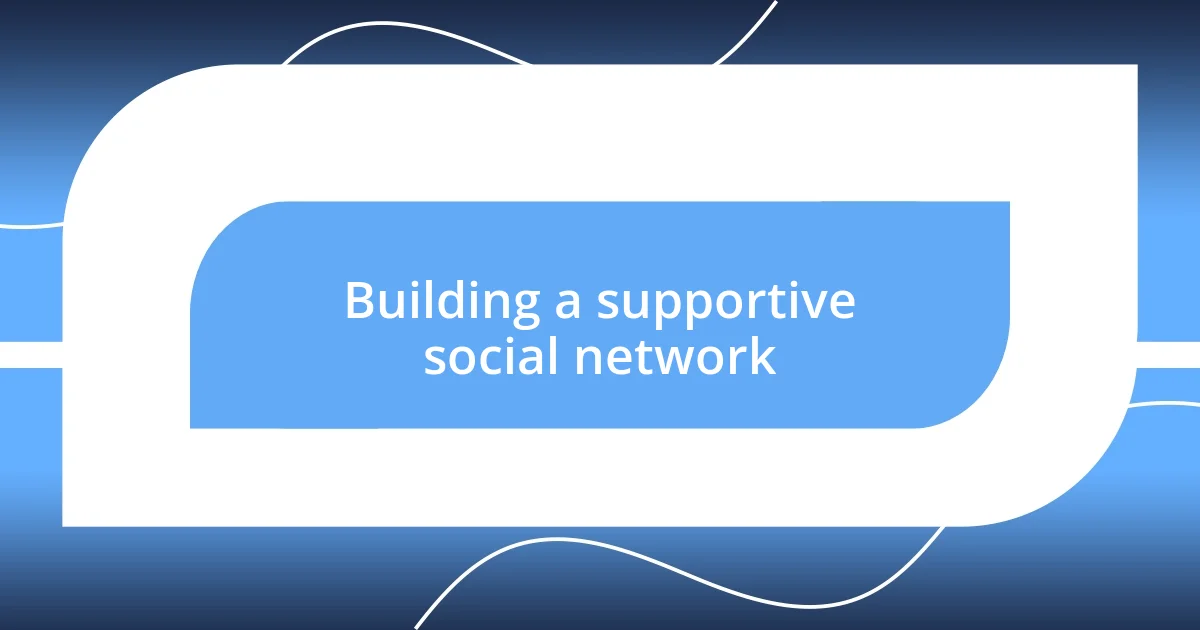
Building a supportive social network
Building a supportive social network has been a transformative aspect of my stress management journey. I vividly recall a time when I faced a particularly challenging project at work. In that moment of overwhelm, reaching out to a close friend made all the difference. She listened without judgment and shared her own experiences, reminding me that I wasn’t alone. Isn’t it amazing how sharing our struggles can lighten the load?
I’ve also realized that emotional support can come from various sources, not just friends and family. Joining community groups where members share similar interests has provided me with a sense of belonging. For instance, I’ve participated in a local book club, where discussions go beyond the pages and often delve into life’s ups and downs. It’s in these spaces where I’ve found encouragement and perspective. Have you ever connected with someone in a group setting and instantly felt a bond over mutual experiences?
Moreover, the act of giving support can be just as fulfilling as receiving it. I remember volunteering at a shelter and how the gratitude expressed by those I helped boosted my own spirits. In giving my time and energy, I discovered a renewed sense of purpose, which ironically lifted my stress levels. It’s a reminder that building a network isn’t just about who can support us; it’s also about how we can be a light for someone else in their time of need. How has your own network impacted your approach to stress?












